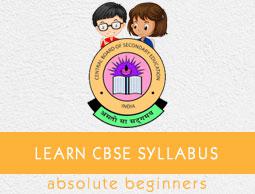CBSE 11th Class Psychology Syllabus
Course Structure
| Part/Unit |
Topics |
Marks |
| A |
Theory |
70 |
| 1 |
What is Psychology |
7 |
| 2 |
Methods of Enquiry in Psychology |
10 |
| 3 |
The bases of Human Behaviour |
8 |
| 4 |
Human Development |
6 |
| 5 |
Sensory, Attentional and Perceptual Processes |
8 |
| 6 |
Learning |
9 |
| 7 |
Human Memory |
8 |
| 8 |
Thinking |
7 |
| 9 |
Motivation and Emotion |
7 |
| B |
Practical |
30 |
| 1 |
Practical (Experiments) file |
5 |
| 2 |
Project File |
5 |
| 3 |
Viva |
5 |
| 4 |
One Experiment |
15 |
| Total |
100 |
Course Syllabus
Unit I: What is psychology?
Introduction
What is Psychology?
Understanding Mind and Behaviour
Popular Notions about the Discipline of Psychology
Evolution of Psychology
Development of Psychology in India
Branches of Psychology
Themes of Research and Applications
Psychology and Other Disciplines
Psychologists at Work
Psychology in Everyday Life −
Unit II: Methods of Enquiry in Psychology
Introduction
Goals of Psychological Enquiry −
Nature of Psychological Data
Some Important Methods in Psychology −
Observational Method
Experimental Method
Correlational Research
Survey Research
Psychological Testing
Case Study
Analysis of Data
Quantitative Method −
Concepts and computation of the Measures of Central Tendency
Graphical Presentation of Data: Bar, Histogram, Polygon (From the CBSE Supplementary Reading Material)
Qualitative Method
Limitations of Psychological Enquiry
Ethical Issues
Unit III: The Bases of Human Behaviour
Introduction
Evolutionary Perspective
Biological and Cultural Roots
Biological Basis of Behaviour −
Structure and Functions of Nervous System and
Endocrine System and their Relationship with
Behaviour and Experience −
The Nervous System −
The Endocrine System
Heredity −
Cultural Basis: Socio-Cultural Shaping of Behaviour −
Enculturation
Socialisation
Acculturation −
Unit IV: Human Development
- Introduction
- Meaning of Development −
- Life-Span Perspective on Development
- Factors Influencing Development
- Context of Development
- Overview of Developmental Stages −
- Infancy
- Childhood
- Challenges of Adolescence
- Adulthood and Old Age
Unit V: Sensory, Attentional, and Perceptual Processes
- Introduction
- Knowing the world
- Nature and varieties of Stimulus
- Sense Modalities −
- Visual Sensation
- Auditory Sensation
- Attentional Processes −
- Selective Attention
- Sustained Attention
- Perceptual Processes −
- Processing Approaches in Perception
- The Perceiver
- Principles of Perceptual Organisation
- Perception of Space, Depth, and Distance
- Monocular Cues and Binocular Cues
- Perceptual Constancies
- Illusions
- Socio-Cultural Influences on Perception −
Unit VI: Learning
- Introduction
- Nature of Learning
- Paradigms of Learning
- Classical Conditioning
- Determinants of Classical Conditioning
- Operant/Instrumental Conditioning −
- Determinants of Operant Conditioning
- Key Learning Processes
- Observational Learning
- Cognitive Learning
- Verbal Learning
- Concept Learning
- Skill Learning
- Transfer of Learning −
- Learning Curve (From the CBSE Supplementary Reading Material)
- Factors Facilitating Learning
- The Learner −
- Learning Disabilities
- Applications of Learning Principles
Unit VII: Human Memory
Introduction
Nature of memory
Information processing Approach: The Stage Model
Memory Systems − Sensory, Short-term and Long-term Memories
Levels of Processing
Types of Long-term Memory
Knowledge Representation and Organisation in Memory
Memory as a Constructive Process
Nature and Causes of Forgetting
Forgetting due to Trace Decay, Interference and Retrieval Failure
Pathologies related to Memory (From the CBSE Supplementary Reading Material)
Enhancing Memory
Unit VIII: Thinking
Introduction
Nature of Thinking
The Processes of Thinking
Problem Solving
Reasoning
Decision-making
Nature and Process of Creative Thinking
Developing Creative Thinking
Thought and Language
Development of Language and Language Use
Unit IX: Motivation and Emotion
Introduction
Nature of Motivation
Types of Motives
Biological Motives
Psychosocial Motives
Maslow‟s Hierarchy of Needs
Nature of Emotions
Physiological Bases of Emotions
Cognitive Bases of Emotions
Cultural Bases of Emotions
Expression of Emotions
Managing Negative Emotions
Enhancing Positive Emotions
Human Existence (From the CBSE Supplementary Reading Material)
Competence (From the CBSE Supplementary Reading Material)
Self-efficacy (From the CBSE Supplementary Reading Material)
Intrinsic motivation (From the CBSE Supplementary Reading Material)
Development of positive emotions (From the CBSE Supplementary Reading Material)
To download pdf Click here.


